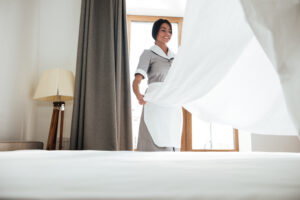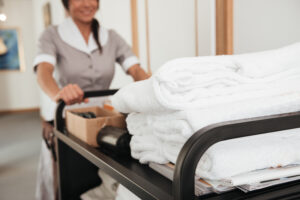What Type of Panic Button System is Right for Your Hotel?
The majority of the Hospitality workforce is comprised of women, according to the Bureau of Labor Statistics, almost 90% of hotel housekeepers are women. Hotel housekeepers are more likely to be harassed and assaulted due to the isolated nature of their jobs, as they are often required to work alone. A 2016 survey of 500 women working in the Hospitality Industry found that 56% of women who had been harassed by guests did not feel safe returning to work. The Hotel Industry is well known for its high turnover rate of over 70% and working in an unsafe environment could be a contributing factor. 96% of those surveyed, felt that hotel panic buttons would give them a sense of safety while at work.
Which Hotel Panic Button System is Most Effective?
There are a few types of employee safety devices/ panic button systems to choose from, such as full system panic buttons, mobile panic buttons and noise makers. But which type fits panic button legal requirements, panic button brand standards and which is most effective at keeping employees safe?
Full System Hotel Panic Buttons
Panic button systems are location based and require the installation of location beacons in each guest room/ area. Once these devices are activated, they identify the closest location beacon and a widespread emergency alert is sent out to the dispatch center in the hotel with precise location details. One advantage of panic button systems is its ability to send out a silent alarm that cannot be heard by the assailant.
Key Considerations
- Panic button systems require the installation of location beacons in every room/area, plus a central reporting infrastructure.
- Panic buttons would cost $10,000 for the system and $150 per month for service and support.
- Panic buttons can be configured to send emergency alerts to predetermined emergency contacts or to local authorities.
- Panic buttons transmit locations down to the precise floor and room number where the distress signal originated.
- Information is sent in real time and is updated if the employee in distress changes location.
Mobile Panic Buttons
Mobile panic button systems require hotel employees to download an emergency communication app to their mobile devices. When mobile panic buttons are pressed, the device sends out the employee information as well as the precise location of the emergency to hotel security personnel.
Key Considerations
- Mobile panic button systems could cost $5000 to purchase, or some options require no money at purchase but would require a small monthly fee for service.
- Mobile panic button systems support two-way communication.
- Mobile panic buttons enable one push activation, that can be configured to alert hotel security personnel as well as local authorities.
- Devices can be installed using existing Wi-Fi- infrastructure.
- Mobile panic buttons utilize 4G technology to detect location and provide real time alerts.
Noise Makers
Noise makers are devices that produce sounds of up to 130 decibels, that is substantially loud when compared to the average speech of around 55 decibels. When devices are pressed, they emit an ear-piercing sound that could possibly deter an attacker and could also capture the attention of those within close proximity. One disadvantage of noise maker devices is its inability to alert hotel security or to provide the location of the employee in distress. The loud noise could also cause an assailant to become more aggressive in an attempt to silence the alarm.
Key Considerations
- Noise makers are the most cost-effective solution and would generally cost $10 per employee.
- While the price can be attractive to hotels, noise makers do not send any emergency alerts or provide location details to hotel security personnel.
- Noise makers can be drowned out by television noise or cleaning equipment like vacuums.
- Building materials such as concrete floors and ceilings reduce sound by as much as 70 decibels.
- Drywall and other construction can also reduce sound by as much as 40 decimals.
Hotel Panic Button Laws and Brand Initiatives
Many hotel brands have committed to providing their employees with employee safety devices/ panic buttons as a part of the AHLA’s 5-Star Promise. Many states and cities have also passed panic button laws requiring that hotels equip their employees with panic buttons and deadlines are fast approaching. Each jurisdiction has specific criteria of what constitutes as an employee safety device/ panic button.
Washington State Panic Button Legislation
Panic button systems should be designed to be carried by the employee (lanyards, clip-ons, etc.)
- Panic button devices should be easily activated by a single action like a push, pull or tap. They must provide a sustained signal without delays caused by entering passwords or waiting for the system to turn on.
- When panic buttons are activated, the signal is effective for the circumstances (e.g., designated personnel will be able to detect it regardless of their location and distinguish it from other audible or visual alarms and noise from vacuum cleaners and other sources.)
- Panic button devices should be designed to summon immediate assistance and enable responders to accurately identify the location of the distressed employee.
- Devices should consistently work in all locations, on all shifts and the activation of one device should not obscure the activation of other devices.
- The device should minimize unintentional activation and resist possible disabling by attackers.
Miami Beach Panic Button Legislation
Panic button systems should be portable emergency contact devices, that when activated provide employee location and summon the appropriate hotel personnel.
- Panic button systems must have the capability to provide reliable locations down to room-level accuracy of where the distress signal originated.
- Panic button systems must provide adequate coverage in all public spaces of the hotel, such as bathrooms and spa areas, as well as guest rooms and floors.
- Employees who are regularly in direct contact with guests should be provided with panic buttons.
What is The Right Choice for Your Hotel?
Noise makers predate panic button systems and have been in use by hotels for over a decade. Ahead of the 2019 implementation of the Miami Beach panic button legislation, many hotels had begun equipping employees with noise makers as a means of complying with requirements. However, the Miami Beach legislature clearly requires that safety devices provide employee location. Noise makers also do not meet union requirements, and do not meet requirements for hotel panic button laws passed in other states, such as Chicago, Washington State and New Jersey as they require devices to have location capabilities. While noise makers might be an attractive option because of the cost, the disadvantages outweigh the benefits, as they do not have the capability to send out alerts or location details that would provide the immediate assistance that employees need.




